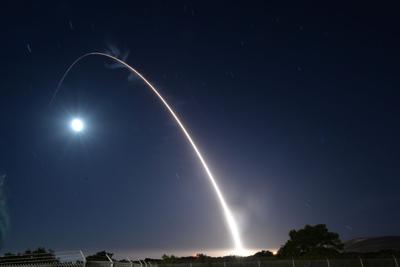GREAT FALLS, Mont. - Earlier this week on April 9, Senator Jon Tester pressed Air Force leadership for answers regarding the Sentinel project in a Senate Appropriations Subcommittee on Defense hearing regarding a review of the president's fiscal year 2025 budget request for the Air Force and Space Force.
The Sentinel project is the modernization of the land-based leg of the U.S. nuclear triad as the Air Force works to upgrade and replace the current Minute Man III Intercontinental Ballistic Missile (ICBM) system with the new Sentinel Missiles.
In the hearing, they talked were reviewing the president's FY2025 budget that includes a request of more than $19.4 billion of funding for nuclear modernization efforts including the Sentinel Ground Based Strategic Deterrent, B-21 Raider, Survivable Airborne Operations Center (SAOC), Long-Range Standoff Weapon, Next-Generation Overhead Persistent Infrared programs, and the Evolved Satellite Communication System.
Currently, Sentinel is undergoing a critical Nunn-McCurdy review due to cost and schedule increases.
"We have to ensure that we have a robust and effective triad. And of course, the ICBM leg of that triad is the most responsive, and that has a great deterrence effect. So we will remain committed to the recapitalization. And as we look at the Nunn McCurdy process play out, we are supporting that and we're continuing our engineering and manufacturing development as that occurs. But regardless of what the decision is in July, we remain committee to ensuring that recapitalization in whatever form that takes," said General David Allvin, the Air Force Chief of Staff.
The recently announced Nunn McCurdy cost breach on the Sentinel ICBM program is still being addressed and final estimates are not available at this time.
Senator Tester emphasized in response that the Air Force must establish a concrete timeline for the ICBM replacements.
"I just think it's critically important and I think that if we don't get a good solid timeline about when things are going to happen… then we can anticipate that we'll never hit that 2036 mark," said Tester.
According to the Department of the Air Force Posture Statement, the FY25 Air Force budget request is $188.1B. The Air Force budget invests in foundational accounts in an attempt to arrest the year-over-year degradation of the capabilities, operational readiness, and supporting infrastructure necessary to implement the NDS, but doing so mandates a slower rate of needed modernization which increases the risk to the DAF’s overall readiness. The budget fully funds nuclear modernization programs to deter strategic attacks, continuing the most extensive recapitalization effort of the nuclear enterprise in the Air Force’s history. It also continues investment in modernization focused on critical long-range kill webs ($310.6M) and affordable mass ($719.8M) central to the ability to deter and, if necessary, defeat aggression. This is in clear recognition of the PRC pacing challenge and Russian acute threat. The Air Force budget request also invests in the Air Force’s most precious asset--its Airmen--to ensure they remain the decisive advantage the Nation depends upon.

































